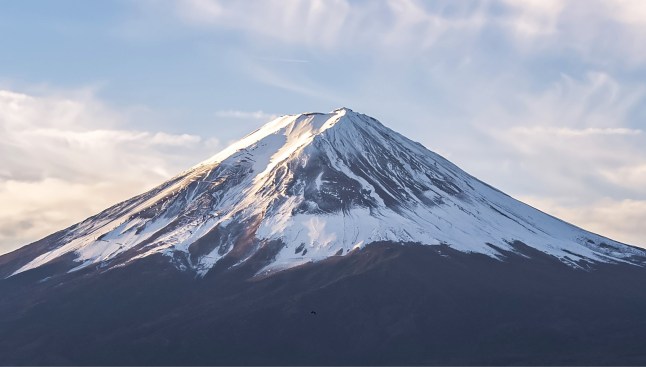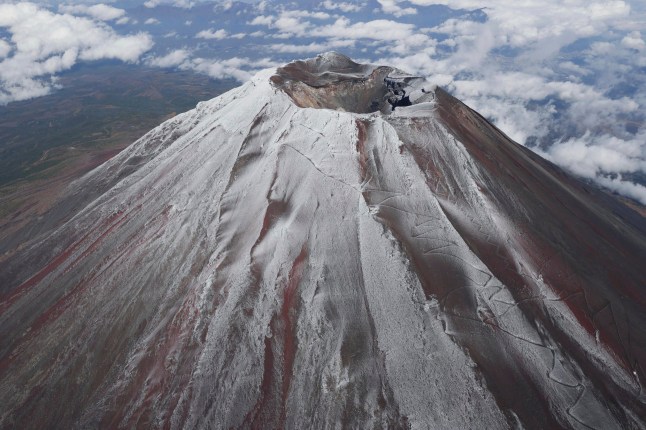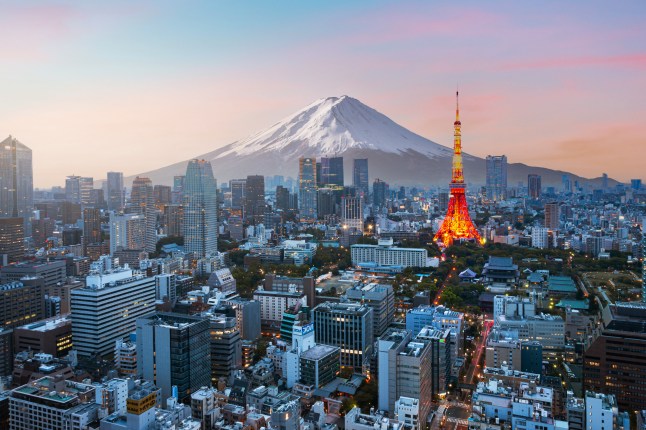
A university student had to be rescued twice in four days from Mount Fuji in the off-season — after returning to search for his mobile phone.
The 27-year-old climber was initially rescued by helicopter from a trail on the tallest peak in Japan, which rises to 12,388 feet (3,776 metres).
The Chinese student had to be plucked to safety on Tuesday after he was unable to descend the route when he lost his crampons, a traction device fitted to boots to provide better traction in wintry conditions.
On Saturday, he went back to the mountain to search for belongings he had left behind, including his phone.
Another off-season hiker on the Fujinomiya trail, which lies 9,800ft (3,000m) above sea level, found the man, police said.
The route has the shortest distance to the summit of the four main trails because it departs from the highest altitude.
A police spokesperson told AFP: ‘He was suspected of having altitude sickness and was taken to hospital.’
Officers later found that the student, who lives in Japan, was the same one who had been rescued a few days before, according to media reports citing unnamed sources.

He had returned to retrieve his mobile phone, and it was not known if he was able to find it, the reports said.
Japan’s environment ministry says all trails leading to the summit of the mountain are closed at this time of year.
The official climbing season starts in early July and ends in early September, with people told it is ‘very dangerous’ to take on the routes outside of the window.
Official advice states: ‘After the mountain closes, the mountain huts also close, and the harsh weather conditions of Mt. Fuji often bring with them violent gusts of wind and snowstorms, making the risk of mountain accidents extremely high and extremely dangerous.’

Some X users criticised the man for ignoring safety advice in going ahead with his climbs and said he should reimburse the emergency services for the rescue missions.
Kay Taiwo wrote: ‘Sometimes, a lost phone isn’t just a distraction – it can lead to dangerous situations.
‘Glad to hear the climber is safe, but a reminder to stay prepared and prioritise safety in challenging environments like Mount Fuji.’
Mount Fuji, which last erupted 300 years ago, is globally renowned for its perfect symmetrical shape and has been immortalised in artworks including Hokusai’s ‘Great Wave’.
Last year, the authorities moved to address overcrowding and litter by introducing an entry fee and a cap on numbers on the most popular route, the Yoshida Trail.
The move followed more than 220,000 people making the ascent between July and September the year before.
Starting this summer, hikers on any of the mountain’s four main trails will be charged an entry fee of 4,000 yen (£21).
The official Mount Fuji website has advice about lost belongings, advising climbers to inquire at trailheads or call the police.
Get in touch with our news team by emailing us at webnews@metro.co.uk.
For more stories like this, check our news page.


